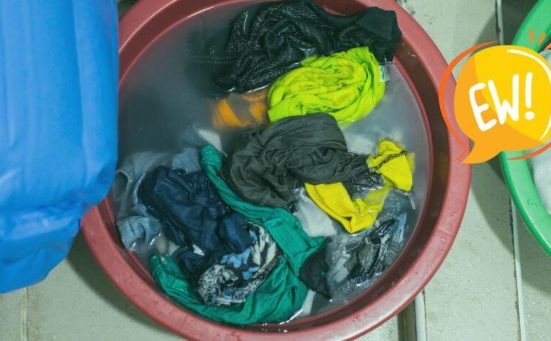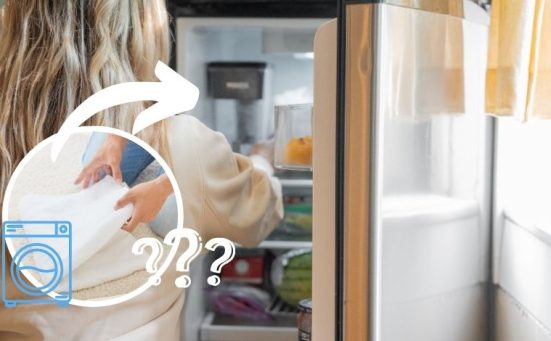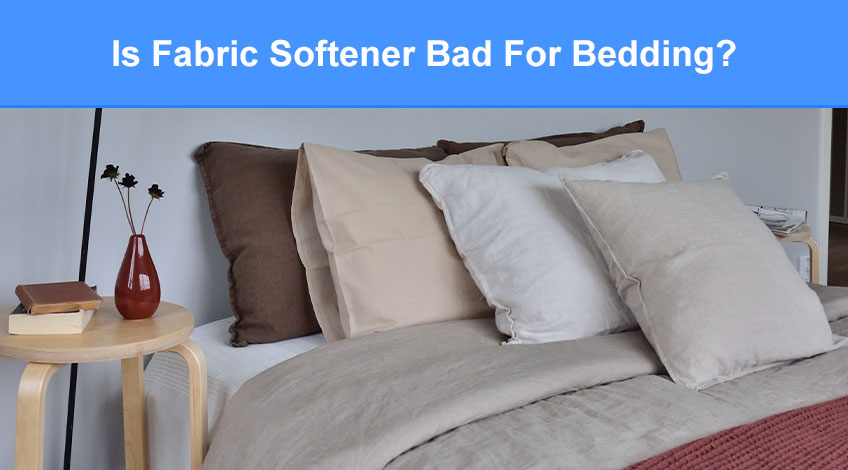
Is Fabric Softener Bad For Bedding? (& is there something better?)
Whichever type of sheets you have on your bed, nothing beats getting into freshly laundered sheets at the end of a long, hard day. You might think that the best way to ensure that sheets stay feeling soft and smelling fresh, is to use fabric softener, but it’s not necessarily so.
To find out if fabric softener is bad for bedding, keep reading.
What Do Fabric Softeners Do?
Fabric softeners are designed to make fabrics softer, fluffier and fresh smelling. While at the same time, reducing static and helping to prevent pilling.
They’re formulated from various chemical combinations that include a silicone based oil that coats the fibres of the fabric to prevent those fibres getting tangled during the washing and/or drying process.
The disadvantages of using fabric softeners include;
Fabrics Become Less Able To Absorb Moisture
The silicone oil based substance coats the fibres that make the fabric which makes them lose the ability to absorb moisture. Eventually this leads to the materials not getting clean at all.
This is due to the way fabrics release dirt once wet. When we wash our clothes or bedding, water soaks into the fabric and loosens the dirt, sweat and stains which then gets washed away by detergent and more water.
If the fabric can no longer absorb water, it cannot let the dirt, etc escape. This means no matter how long the item is washed for, it will remain dirty.
It Inhibits Any Flame Retardant Coating
The main problem here is some of the chemicals used to make the fabric softeners are flammable. These chemicals coat the flame retardant fabrics and eventually attach themselves.
Rendering the fabric more flammable than it was in the first place.
Reduces The Fabrics Ability To Wick Moisture
There are some fabrics that actually draw moisture away. This process is known as wicking and is often used for making sportswear and some bed sheets (microfiber for instance).
Once the fabric becomes coated in fabric softener, it literally gets clogged up. Which means the moisture cannot escape.
It Can Cause Health Issues
There have been numerous scientific studies done that have linked the chemicals used in many fabric softeners with various health problems.
These include many skin allergies, respiratory problems including asthma, and certain types of cancer.
Some of the more well known chemicals include;
- Glutaraldehyde
Also known as glutaral, this has been linked with skin allergies and asthma. - Ethanol
Ethanol has been linked with disorders that affect the central nervous system. - Benzyl Acetate
There have been some links recorded between benzyl acetate and pancreatic cancer. - Benzyl Alcohol
This has been linked with many respiratory problems including coughs, breathing issues as well as asthma. - Hexylene Glycol
Hexylene glycol is one of the main irritants associated with fabric softeners and there are links with skin allergies, eye irritations and breathing problems.
They also contain several compounds that are known as quats which is the shortened version of Quaternary ammonium cations. These are used for their anti-static properties. They are also linked with respiratory difficulties, skin allergies as well as anaphylactic shock and reproduction complications.
It’s Bad For The Environment
As if all of the above wasn’t bad enough, many of the chemicals present in fabric softeners are non biodegradable. This means they don’t break down and as they are included in our waste water, they eventually find their way into our waterways.
Once these harmful chemicals have worked their way into our streams, rivers and oceans, they cause all manner of problems for aquatic and other wildlife.
In many cases these chemicals destroy entire ecosystems. Which can have a devastating effect on surrounding areas as well.
Are There Different Types Of Fabric Softeners?
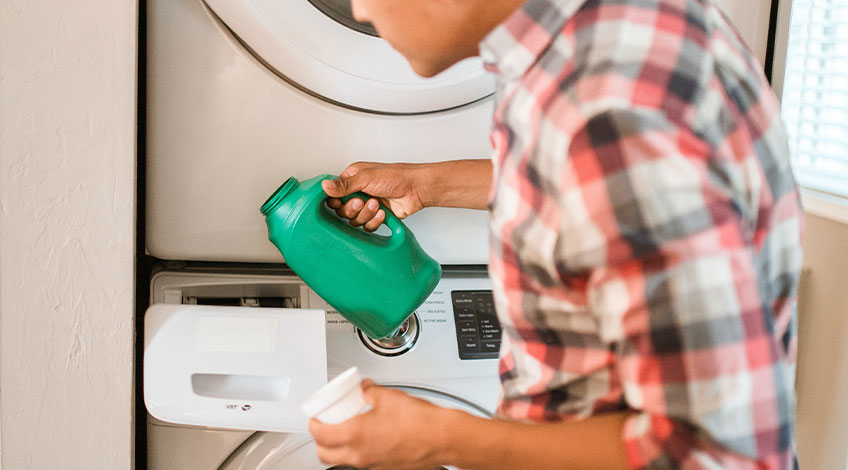
There are two main types of fabric softeners which are;
- Liquid fabric Softener
- Dryer Sheets
They both use the same or similar chemicals but they’re distributed in different ways.
Liquid Fabric Softener
As the name implies, liquid fabric softener comes in a liquid form and is added to the dispenser drawer at the start of the wash cycle. It is poured into the compartment with the symbol of a flower which is often the middle of the three compartments in the dispenser drawer.
First developed in the 1950s in the US, liquid fabric softeners are available in bottles that need to be measured out into the correct quantity for each wash load.
Or pods which are pre-measured to ensure the correct dose is administered in each wash.
Dryer Sheets
Dryer sheets were introduced in the 1970s and are placed directly into the drum of the tumble dryer. They are made from non woven plastic sheets that are treated with liquid fabric softener.
As the dryer heats up, the fabric softener is released from the dryer sheet and dispersed all over the clothes in the dryer.
Can You Use Fabric Softener On Bed Sheets?
Although it might seem like a good idea to use fabric softener on your bed sheets, it’s actually not. This is because the chemicals in the fabric softener coat the fibres of the sheets which prevents air from passing through the bed sheets.
This makes them feel uncomfortable and eventually leads to a buildup of chemicals that will feel slimy and heavy. Added to this is the fact that as the fibres of the sheets become clogged with fabric softener, they will not get cleaned properly.
Leaving your bed sheets dirty and smelly and unhygienic as well.
To this end, if you decide you want to use fabric softener on your bed sheets, you should limit the usage to once every three to four washes. This should be enough to inhibit the buildup of softener and allow your sheets to get clean and breathe.
How Each Type Of Bed Sheet Is Affected By Fabric Softener
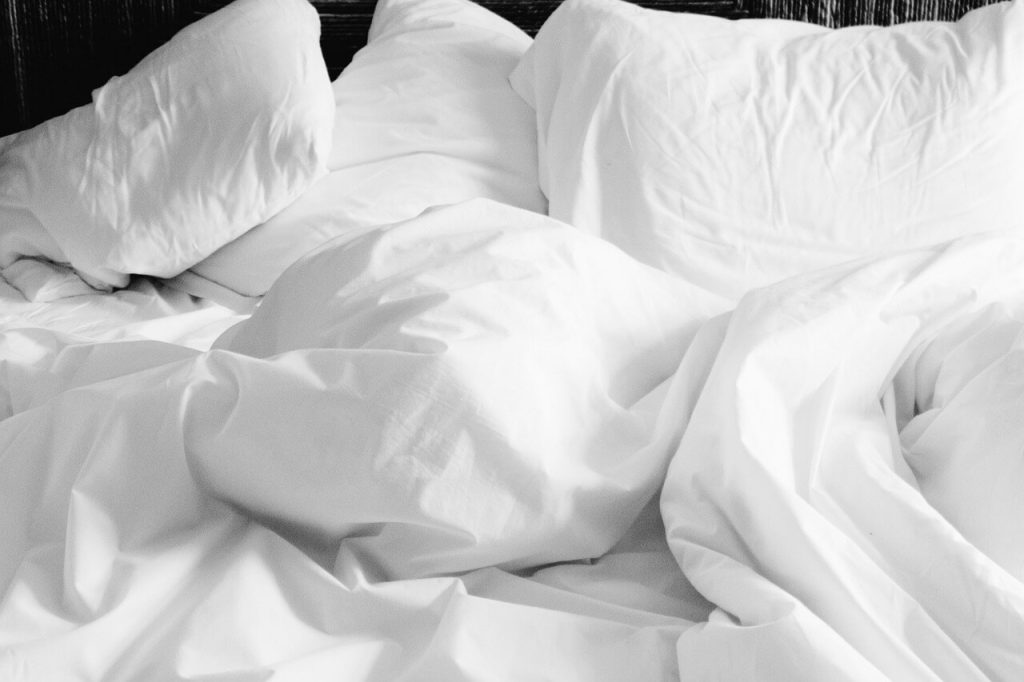
With so many different types of bed sheets available, it pays to know how to treat them. This will ensure they last a long time and remain in good condition and fit for purpose.
Cotton Sheets
The most common type of cotton sheets uses a weave that is known as percale. Which is a type of criss-cross weave that is renowned for getting softer over time. This means there is absolutely no need to use fabric softener on cotton sheets.
100% Egyptian Cotton Sheets
100% Egyptian cotton sheets are more expensive than regular cotton sheets because of their breathability and sumptuousness. The chemicals used in the composition of fabric softeners will damage 100% Egyptian cotton and cause it to lose those special qualities.
Bamboo Sheets
Bamboo bed sheets are a relatively new type of bedding that has recently taken the bedding market by storm. They are super soft, luxurious, hypoallergenic and antibacterial. Fabric softeners can stain and damage bamboo sheets as can many detergents.
To care for bamboo sheets properly, you should wash them in cold water using a mild detergent and dry them on a washing line.
Linen Sheets
Linen sheets have the ability to get softer every time they’re washed. This means there’s no need to use fabric softeners on linen sheets.
In fact using fabric softener on linen sheets is likely to damage them.
Microfiber Sheets
Microfiber sheets are incredibly lightweight and have amazing wicking properties. This means any sweat is wicked away allowing you to sleep peacefully.
You should never use fabric softener on microfiber sheets as it will damage the fibres and clog the holes that allow wicking to occur.
Flannel Sheets
Flannel sheets are known for their softness and their warmth, which is super-cosy during the winter months!
Using fabric softener will make that softness disappear in a very short time. Leaving your flannel sheets feeling stiff and hard.
Silk & Satin Sheets
Silk sheets and satin sheets both feel luxuriously soft and have great temperature regulating properties. They need to be cared for in a special way that never includes fabric softener.
If you were to use fabric softener on silk or satin sheets they would become damaged and very likely stained by the harsh chemicals of the fabric softener.
Silk and satin sheets should be washed in cold water, never tumble dried and never air dried in direct sunlight.
Are There Any Alternatives To Fabric Softeners That Can Be Used On Bedding?
As can be seen above, using fabric softener on bedding is not such a good idea. But that doesn’t mean your bed sheets have to become stiff, hard and uncomfortable.
There are many natural alternatives that you can use which include;
Bicarbonate Of Soda
- ECO-FRIENDLY: Sodium Bicarbonate / Baking Soda is one of the top eco-friendly , safe and inexpensive cleaning, baking and household products available.
- CLEANING: Baking Soda is particularly useful in food preparation, cleaning surfaces, ovens, grills, microwaves and fridges whilst also deodorising and freshening without leaving any harsh chemical smells.
Bicarbonate of soda is a safe, well known alternative to fabric softener. It is particularly useful on linen sheets but will be just as good on others too.
All you need to do is add ½ a cup in with your regular detergent and wash as normal.
White Vinegar
- PERFECT FOR COOKING - Use in vinaigrettes, sweet-and-sour dishes, marinades, pickles, chutneys, and butter sauces. Or infuse with fresh herbs to make flavoured vinegar. Whatever the occasion our Fresh White wine vinegar will be perfect.
- FABRIC SOFTENER - This white vinegar is perfect for households that have pets and children around as well as commercial premises where health and safety is of paramount importance
White vinegar is a great natural fabric softener and can be used on many fabrics. Simply add ½ a cup to the rinse cycle when washing your sheets.
Wool Dryer Balls
- 【Handmade & High-Quality 】- Made of 100% premium New Zealand wool. Completely handmade, and contains no fillers, no chemicals, or synthetics
- 【Reusable】- These woolen balls can be used hundreds of times in the tumble dryer to speed up the drying process, remove lint and reduce static from the laundry load!
These work by bouncing around in the dryer colliding with your sheets and softening them as they go. Using wool dryer balls will decrease drying times by around 25%.
If you want your sheets to have a pleasant fragrance after being laundered, just pour a few drops of your favourite essential oils on the balls before adding them to the dryer.
If you don’t have wool dryer balls, you can use clean tennis balls instead.
How Often Should Bed Sheets Be Washed?
We spend around 8 hours every day in bed. Whilst there, we sweat, release oils and germs as well as bacteria that is naturally present on our skin. For this reason, we should wash our bed sheets once a week.
If you find yourself sweating prolifically, you should increase that to twice a week.
When washing sheets they should have their own separate wash and not be included with clothing or towels. The lint from other clothes or towels can get onto the sheets causing all manner of problems.
Plus, any catches, zips or buckles could damage the fine weave of your bed sheets causing holes, rips and tears.
What Temperature Should Bed Sheets Be Washed At?
Before washing your bed sheets, you should always check the wash care label. Most bed sheets can be washed at 60 degrees C on a long (2 hours+) wash cycle.
Washing bed sheets at a lower temperature is unlikely to remove all of the germs, bacteria or sweat from the sheets. You should use a good quality detergent and don’t add fabric softener.
SEE ALSO: What Temperature Do You Wash Bedding At? (for every fabric type)
What Temperature Should Bed Sheets Be Dried At?
When drying bed sheets in a tumble dryer, you should use a low or medium heat setting. They should be removed from the dryer around 10 minutes before they are completely dry and ironed immediately to remove any creases and wrinkles.
Wrinkles are way more difficult to remove once the sheets are fully dry and cooled down.
SEE ALSO: Is Fabric Softener Bad For You (or your clothes)?
Frequently Asked Questions
It’s entirely up to you, but we would never recommend using fabric softener on bed sheets. The chemicals in the fabric softener can cause damage to the fabric, cause harm to the environment, and cause allergic skin reactions as well as respiratory problems including asthma and has even been linked to some forms of cancer.
Dryer sheets and fabric softeners use the same or very similar chemicals to coat the fibres of clothes to make them feel soft. The liquid softener is impregnated into the plastic sheets of the dryer sheets and is released once heat is applied.
We would recommend using white vinegar or bicarbonate of soda in the wash as an alternative to fabric softener and wool dryer balls or tennis balls in the tumble dryer.
Also, follow us on Pinterest ...




